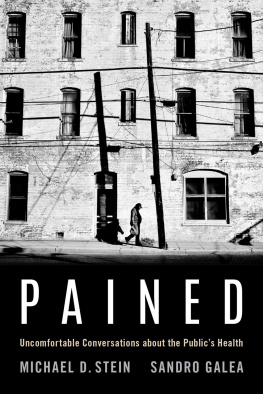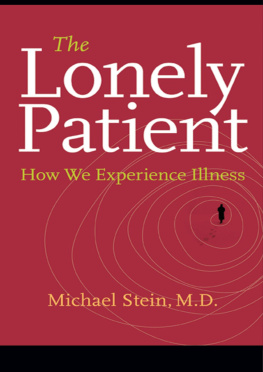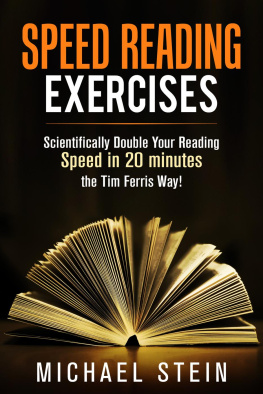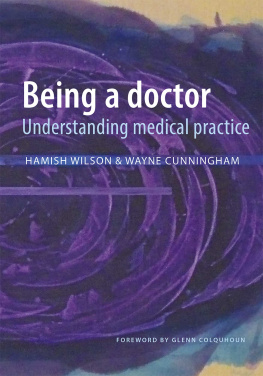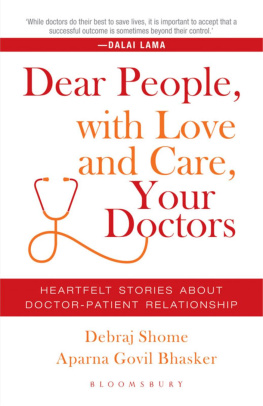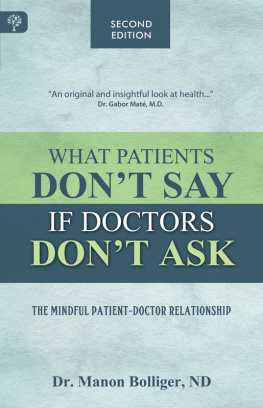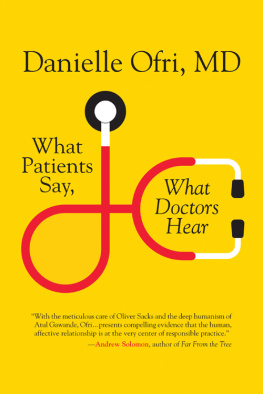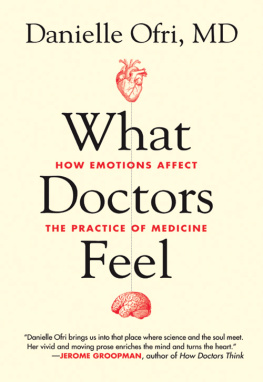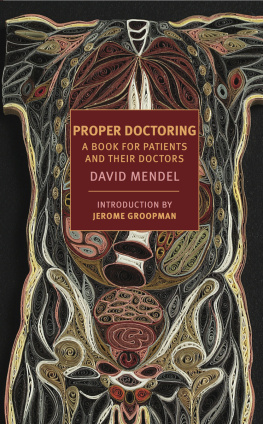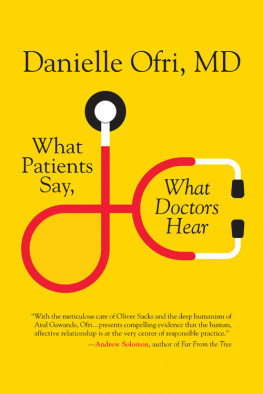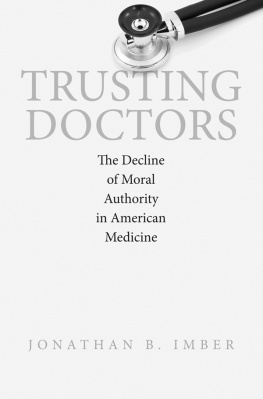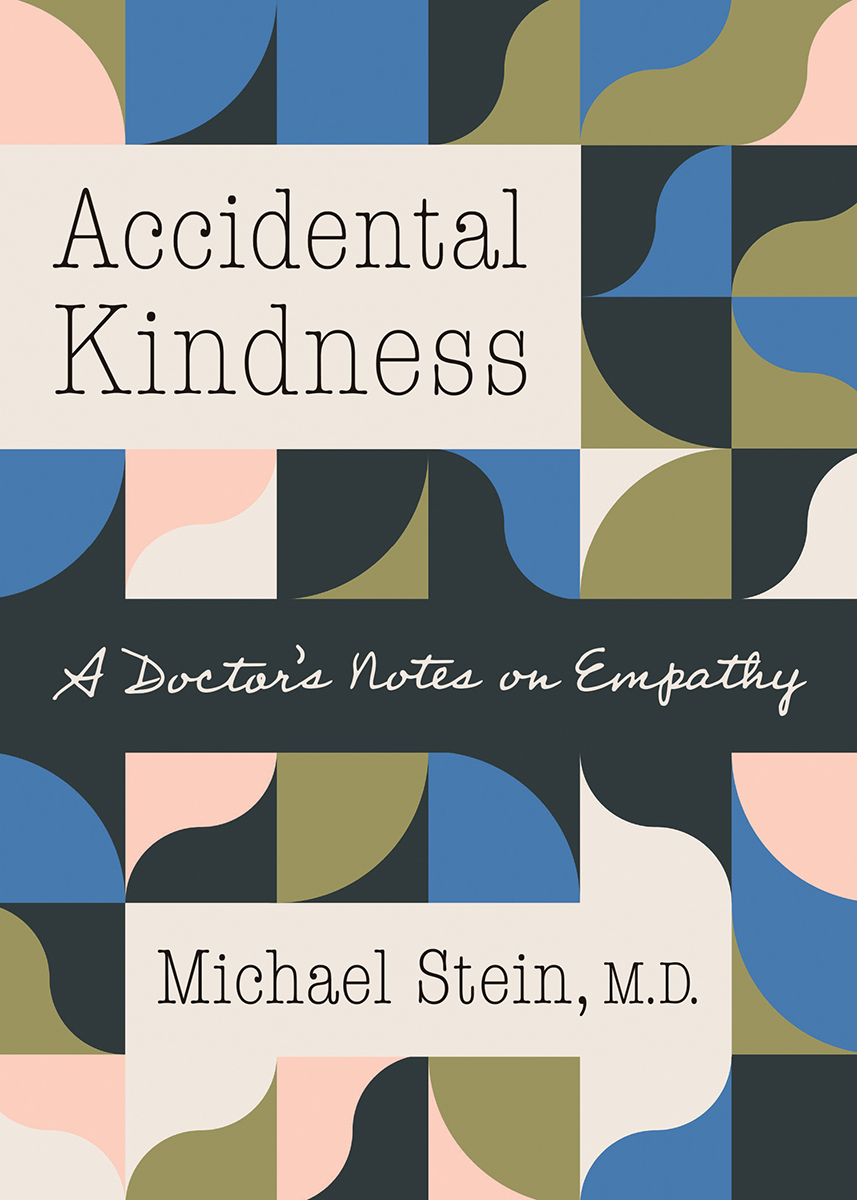
Accidental Kindness
Also by Michael Stein
Fiction
Probabilities
The White Life
The Lynching Tree
In the Age of Love
This Room Is Yours
The Rape of the Muse
Nonfiction
The Lonely Patient: How We Experience Illness
The Addict: One Patient, One Doctor, One Year
Pained: Uncomfortable Conversations about the Publics Health
Broke: Patients Talk about Money with Their Doctor
Me vs. Us: A Health Divided
This book was published with the assistance of the Anniversary Fund of the University of North Carolina Press.
2022 Michael D. Stein
All rights reserved
Designed by Jamison Cockerham
Set in Scala, Professor, and American Typewriter
by codeMantra
Manufactured in the United States of America
Cover illustration: iStock/Normform
LIBRARY OF CONGRESS CATALOGING-IN-PUBLICATION DATA
Names: Stein, Michael, 1960author.
Title: Accidental kindness : a doctors notes on empathy / Michael Stein, M.D.
Description: Chapel Hill : The University of North Carolina Press, 2022.
Identifiers: LCCN 2022017106 | ISBN 9781469671802 (cloth ; alk. paper) | ISBN 9781469671819 (pbk. ; alk. paper) | ISBN 9781469671826 (ebook)
Subjects: LCSH: Stein, Michael, 1960| Physician and patientUnited States. | PhysiciansUnited StatesConduct of life. | Kindness. | Empathy.
Classification: LCC R727.3 .S755 2022 | DDC 610.69/6dc23/eng/20220613
LC record available at https://lccn.loc.gov/2022017106
FOR MY FATHER,
still chasing me,
AND FOR MY SONS,
kind always
It is a little facile, maybe, and certainly hard to implement, but Id say, as a goal in life, you could do worse than Try to be kinder.
George Saunders
CONTENTS
A NOTE TO THE READER
This book contains the stories of real people. They share their stories in confidence and I must honor that trust. I have changed names and genders and places, as well as physical descriptions of the speakers. In some cases, I have created composites to protect anonymity. I hope to disguise; anyone recognizable is coincidental.
Accidental Kindness
Introduction
Soon after I turned fifty, I made a mistake in my medical office and deeply hurt a patient. I said something I shouldnt have, and I knew it immediately. Beatriz had been my patient for many years, and what I said was unkind and probably unforgiveable; I certainly couldnt forgive myself. Not long after, and perhaps as a result of this first mistake, I uncharacteristically made two other small but notable errors in judgment with patients, and then another with a hospitalized patient, Mr. Kadden, whom Id known for years. In the aftermath, I decided to take a month off from my primary care medicine practice.
I was already the author of six novels, so I began to write as a means of discovery and recovery, and as an attempt to make sense of what I had done. When I returned to doctoring, I started the long process of remorse, and over the next years I took notes on moments and experiences of kindness and unkindness, of forgiveness and unforgiveness, that occurred during my clinical hours. I thought about how my patients viewed me, which ones gave me the benefit of the doubt, which ones I had to convince about the rightness of my ideas, which ones I softened or grew tougher around. I sought medical and psychological research that might explain my feelings and behavior. I thought about my medical training. I thought about my father, who had died one night in an emergency room when I was thirteen years oldthe event that drove me toward medicine but that also was at the root of my impossible need to be flawless in my medical activities and my difficulty with self-forgiveness. I wrote in search of coherence. Writing is remembering.
We will all be patients sooner or later. In an emergency, we want our doctors to be decisive, efficient, and competent, and to take on the weightiest of decisions with us and on our behalf. Most doctor visits are not emergencies, thoughthey are literally primary care; and for these routine interactions, while we still want a doctors time, attention, and presence, we are also looking for advice and relief, safety and approval. Hurting, betrayed by our bodies, we think of chronic illness in terms of cause and condemnation, and we believe a doctor can at least partly relieve our self-blame, shame, and sense of inadequacy. We want our doctors to offer kindness under any of its many namesgenerosity, empathy, caring, compassion, benevolence, humanity.
Early during my first year of medical school, I completed a questionnaire that a graduate student was circulating for her thesis. Her survey included the question Would you rather be intelligent or kind? The answer was obvious to me and took not a seconds thought: I checked intelligent. I was, after all, beginning medical school, and intelligence was what I needed, what mattered. Looking back, the entirety of my career has been a slow understanding that I checked the wrong box.
The stories in Accidental Kindness confirm for patients that their doctors often do not give enoughenough touch or care or reassurance or timeand that they are right to ask for more, but also that sometimes the truth hurts patients, even if its kindly meant. I have come to believe that kindness results from an intuition of how much truth to give at any moment, how best to share it, something I never would have guessed when I started medical school.
When I reconsider how doctors are trained and what would lead us to be kind or unkind, I wonder whether unkindnesswhich can be as damaging as other medical errorsis a natural outgrowth of doctors education. Maybe some people are born kind and forgiving; certainly others have to be taught and to try harder. If kindness is the ability to bear the vulnerability of others and oneself, was I ever taught this in my years of schooling? What I learned after leaving school was that kindness, unlike the rest of medicine, must be more than received ideas and information presented in the form of approved emotions. Kindness requires a fresh response and an effort to see clearly and feel directly, even when it is impossible to predict whether and how it will be received at all.
That doctors are accused of unkindness during careers where so many situations are emotionally fraught, when they deal with so many people who are unhappy and in pain and scared, might be expected. Can doctors ever be too kind? Counterintuitively, empathy, the very source of kindness, may also be the source of compassion fatigue. I believe compassion can be pathological. Doctors can reach a state of reduced capacity for kindness as a result of exhaustion from absorbing the suffering of others. Preceding my rupturing visit with Beatriz, might I have anticipated my unacceptable behavior if Id been more alert to my feelings?
Doctors are good at figuring things out, but even better at assigning blame. Patients make big messes of themselves, often caused by the conditions of their livesthe violence at home, the damaged stairs that make them fall, the cigarettes that lessen their anxiety but leave them short of breathgiving doctors plenty of opportunities to reproach, question, reprimand, castigate. Patients, ill, broken, sometimes think badly of themselves. And each day doctors must decide to blame or to be merciful. It shouldnt be a difficult choicedoctors are asked (and paid) to accept life as it presents itself and practice kindness anywaybut it is. Perhaps it is because doctors, as Ive learned, carry their own forms of self-blame. Or perhaps because doctors remain unconvinced that kindness really matters. Does kindness save lives? When the skeptic demands proof, persuasive evidence is indeed hard to find.
Next page

